Aug 24. 2025. North America West Coast Lecture Tour (2) Vancouver
Hello. Today is the second lecture of Sunim’s North America West Coast lecture tour, held in Vancouver, a major city located at the southwestern tip of Canada.
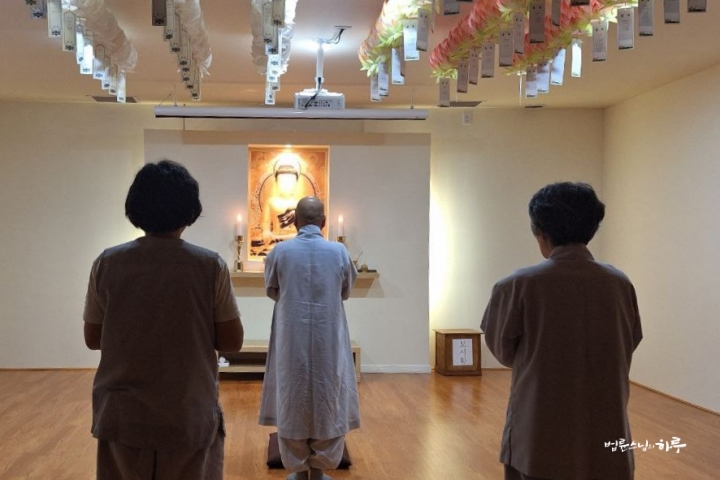
At 5 AM, the day began with morning chanting and meditation at the Seattle Dharma Center. After practice, Kim Hye-jin, the North America-Europe Chapter President of the International Division who had coordinated yesterday’s local meeting, came to say goodbye as she was catching an early morning flight. Sunim expressed his gratitude with words of encouragement for her hard work and presented her with a copy of “Buddha the Revolutionary,” recently published in English.
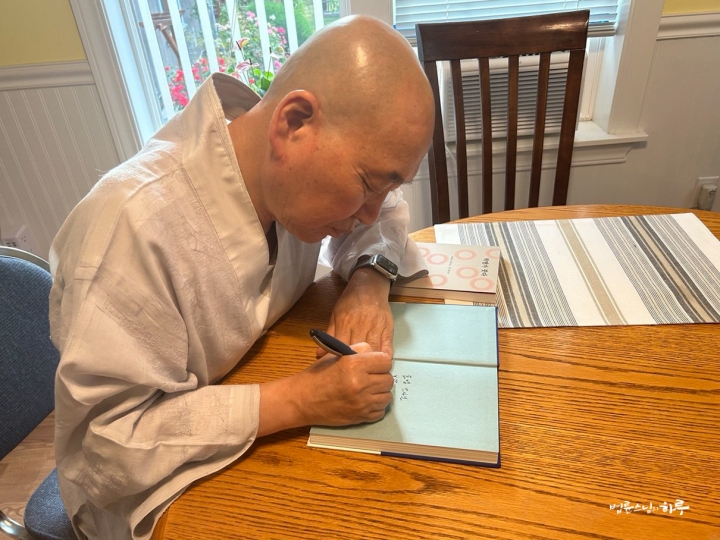
After breakfast, Sunim also presented copies of his book brought from Korea to Dharma Teacher Hyomyeong and Richard who came from LA to attend the foreign participants’ meeting, Dharma Teacher Myomyeong from Seattle Retreat Center, and Kim Hak-ro who volunteered as the driver. Each time a book was handed over, bright smiles bloomed like flowers.
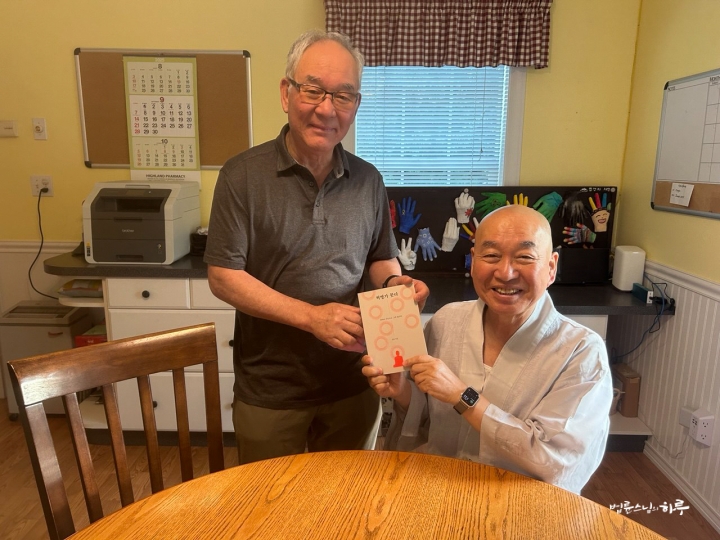
After saying farewell to those returning home, they departed for Vancouver, Canada at 7:30 AM. Sunim usually visits the North American West Coast in September for lectures, but this year the schedule was moved up slightly to late August. The weather was much hotter than usual.
On the way, they stopped at a large supermarket to use the restroom. While the drivers had coffee, Sunim looked around the store and was shocked to see kimbap (California rolls) priced at $10 in the lunch section. Kim Hak-ro explained that prices had risen along with the minimum wage increase to $20 per hour in Washington State.
At 10:10 AM, they arrived near the border. The Canadian immigration process had a short waiting line and was smoothly completed in just 10 minutes. After driving another 30 minutes, they arrived at Kim Hyun-mi’s residence at 10:50 AM.
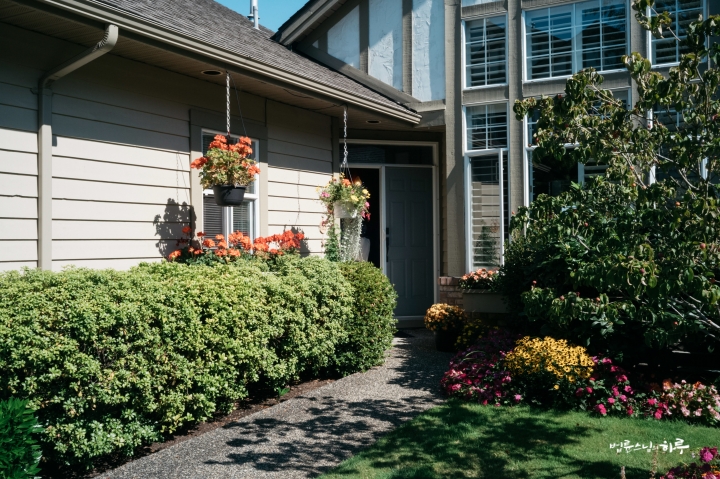
Since Sunim resumed overseas lectures in 2023 after the COVID pandemic, Kim Hyun-mi has been providing accommodation and meals whenever Sunim visits Canada. This is already the third year. The house was located by a lake, quiet and peaceful. A coyote appeared in the backyard, capturing everyone’s attention. It was a brief glimpse of daily life in Canada, living in harmony with nature. After lunch, they took a short rest to recover from the fatigue accumulated due to jet lag.
Before departing for the lecture venue, Sunim presented Kim Hyun-mi with a Buddha portrait brought from Bodh Gaya. He also took commemorative photos with Kim Hyun-mi’s family and with volunteer Kim Sang-hee.
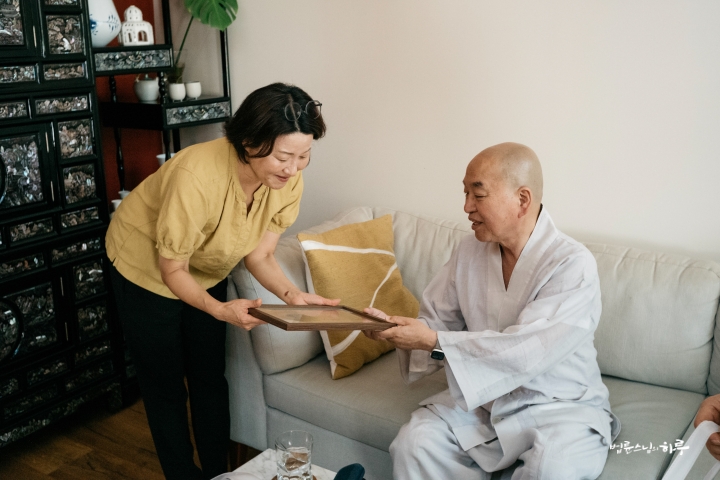
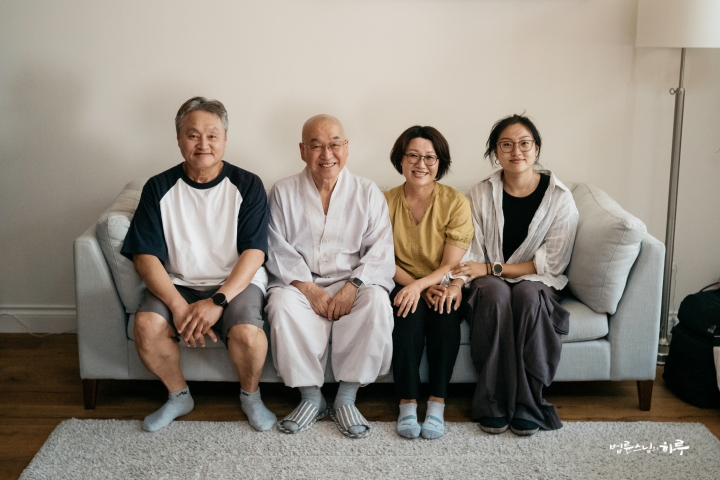
They departed for the lecture venue at 1 PM. Today’s lecture is being held at the Michael J. Fox Theatre in Burnaby, British Columbia, Canada. It is said to be a representative performance venue in the area where various concerts and cultural events are held. When they arrived at the venue, volunteers were busily preparing to welcome participants.
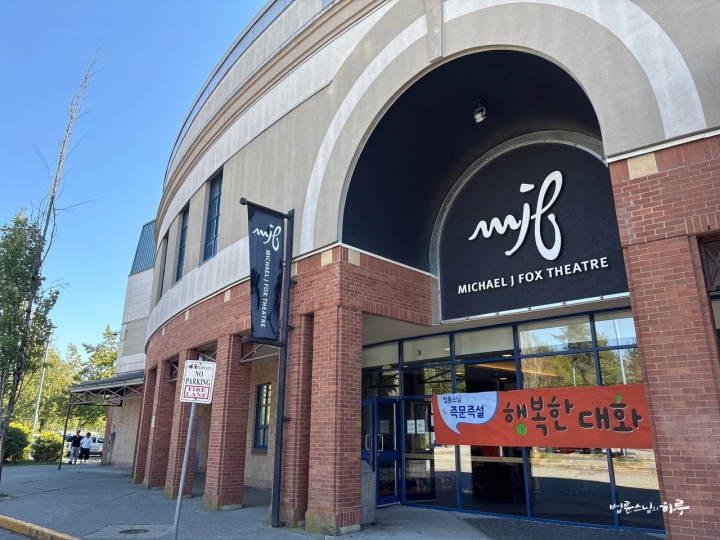
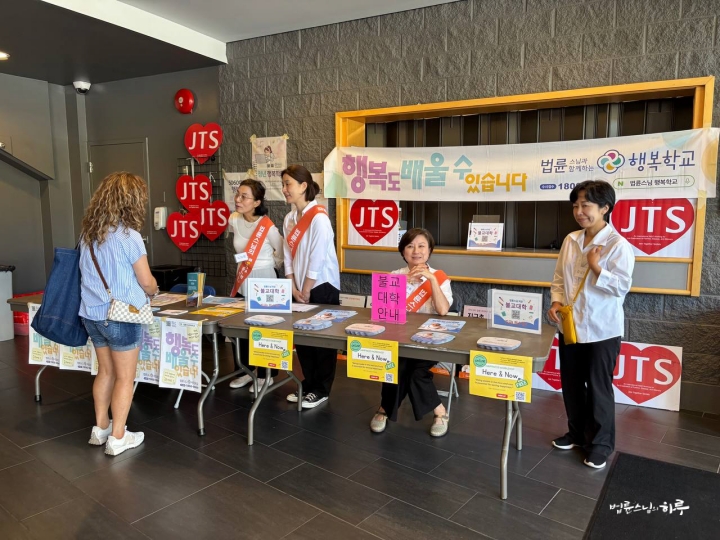
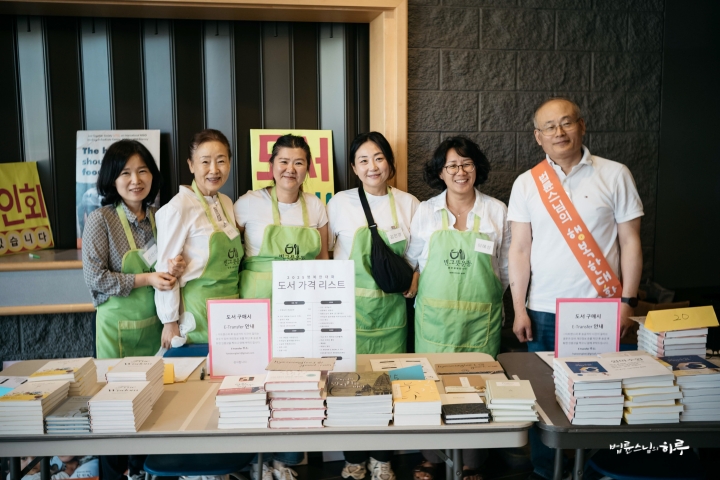
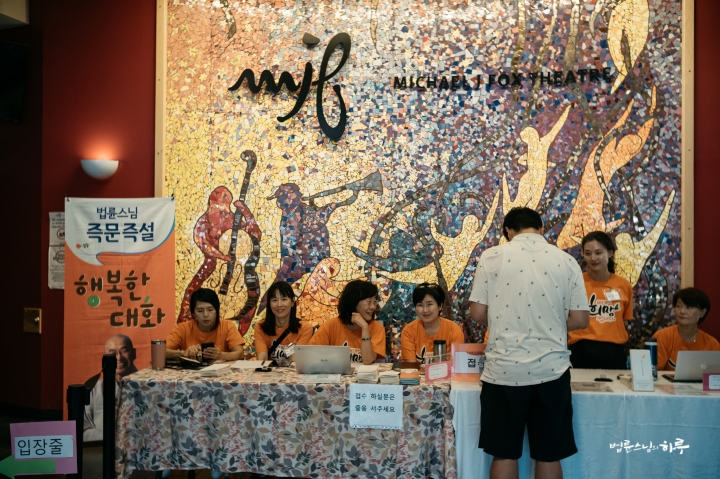
Sunim greeted the volunteers, saying, “I came early because I thought there wouldn’t be enough time to greet everyone after the lecture.” About 50 volunteers had gathered at the venue. They sat in a circle in the empty theater and chatted briefly.
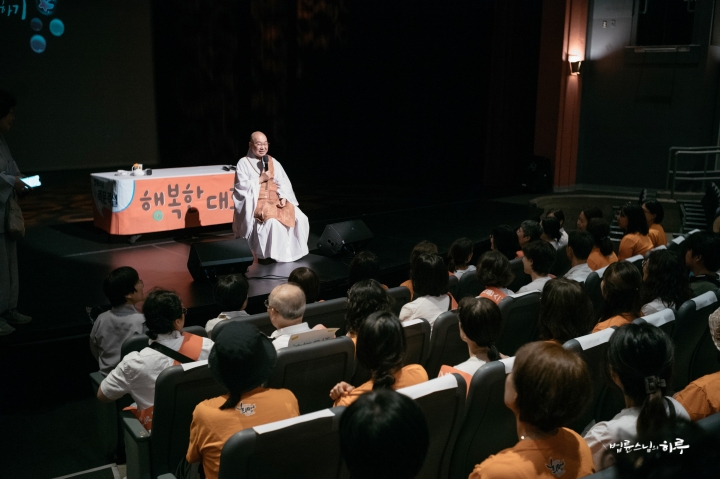
“We could hold a lecture just with the volunteers alone.” (laughter)
Last year’s Vancouver lecture drew 440 people, but many couldn’t enter due to lack of seats. So this year, they rented a 600-seat theater.
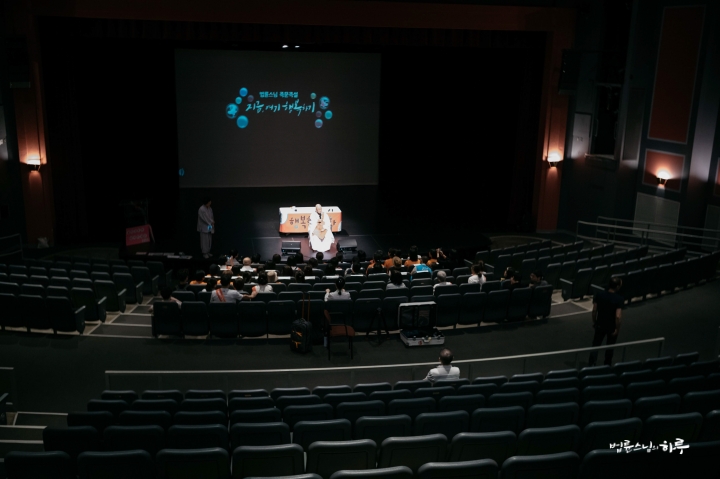
“Sunim, I’m worried we might not fill all the seats because it’s vacation season.”
“That’s fine. The theater is very nice. Thank you for your hard work.”
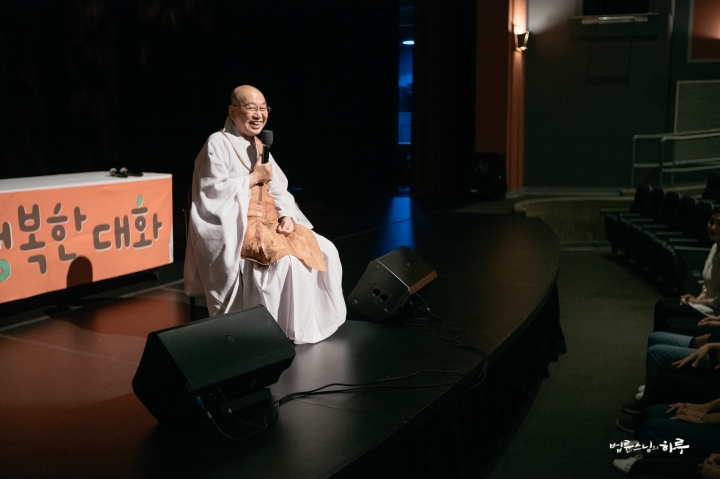
Sunim then conversed with the volunteers, asking whether they had graduated from Jungto Dharma School, whether they had been on a pilgrimage to India’s sacred sites, whether this was their first time volunteering for a lecture, and where they had come from.
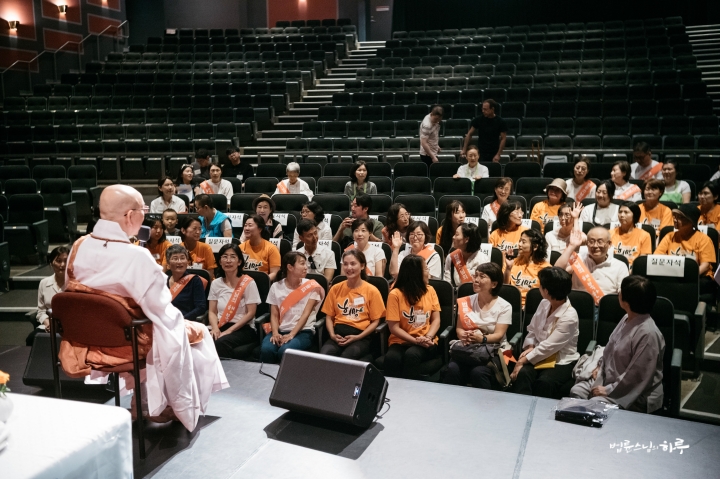
Among the volunteers was someone who was joyfully participating in volunteer work even at the age of seventy-four. After conversing for about 30 minutes, they took a group photo together.
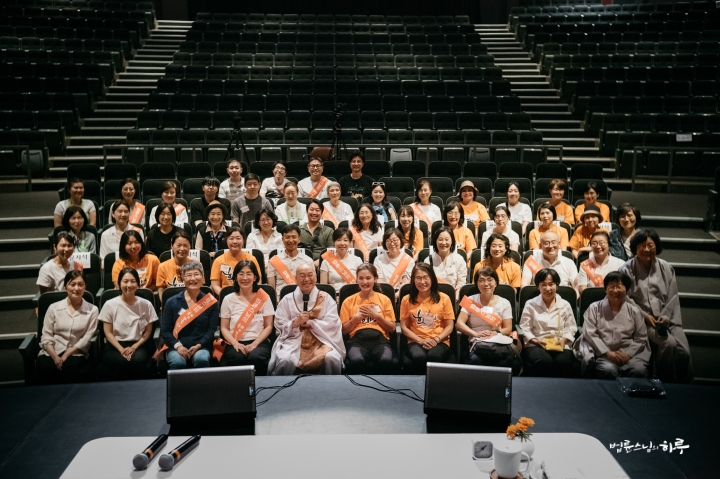
Afterwards, Sunim had a conversation with Kim Gil and Erin Reger, the couple who served as interpreters for the Vancouver and San Francisco local meetings.
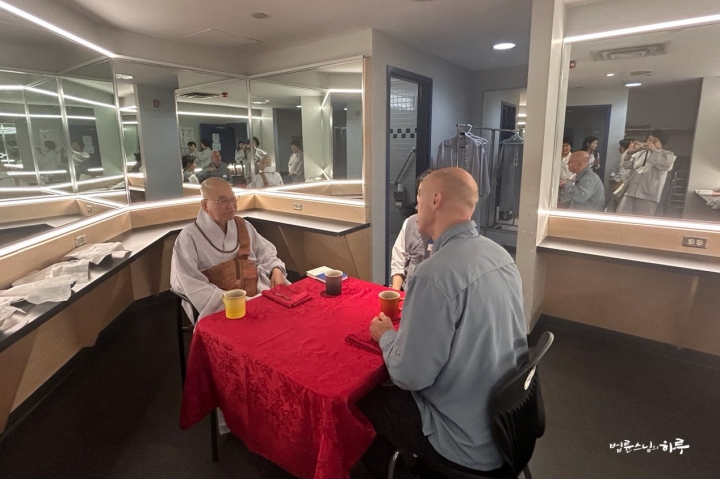
Erin Reger, after working as a nurse for 20 years, entered medical school with the intention of volunteering at Jivaka Hospital in India and completed his residency program last June. While talking with Sunim, they discussed various ways to conduct medical activities in India, and he decided to first visit India for 1-2 months at a time. They also exchanged opinions on how to expand medical support to neighboring countries such as Bhutan and Myanmar. The Reger couple deeply thanked Sunim for giving them the opportunity to volunteer. Sunim presented them with the English edition of “Buddha the Revolutionary” as a gift.
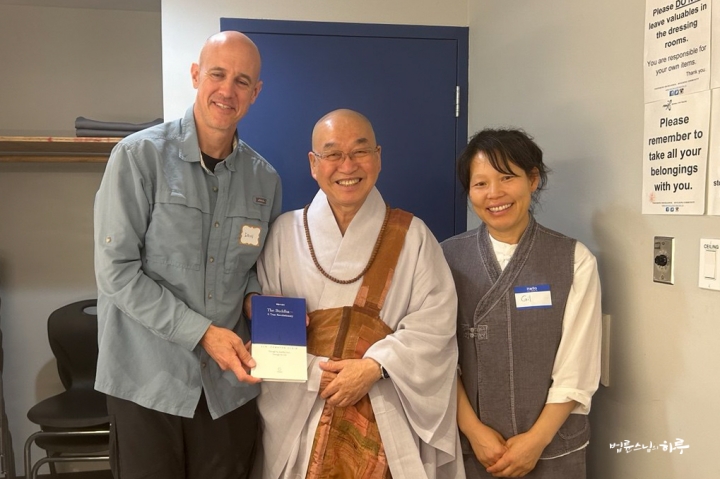
From 2:30 PM, Sunim held a meeting with foreign students who had graduated from Jungto Dharma School in Vancouver. Six graduates and about 10 International Division volunteers attended. The participants sat in a circle and took turns introducing themselves.
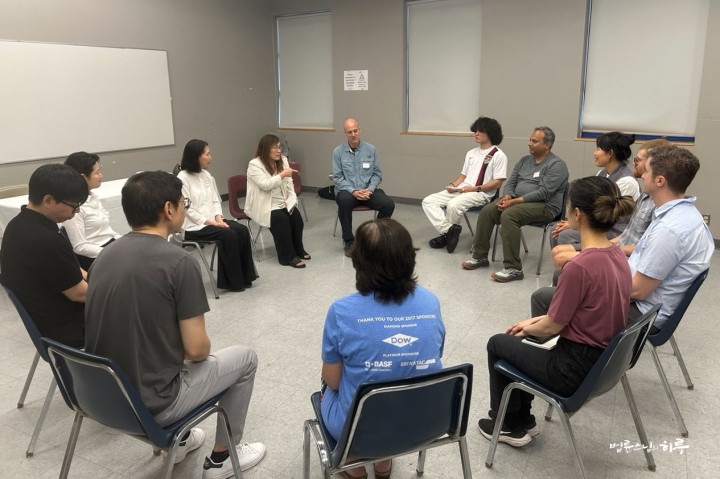
“I’m Kirsten from Montreal, Canada. I’ve been with Jungto Society for about 4 years. I’ve met Sunim in various places in Korea, and I’m really happy to see you again in Canada.”
“Sunim, thank you for coming back to Canada. My wife and I completed stages 1 and 2 of Jungto Dharma School. Since starting Jungto activities, our home has become much more peaceful. My thoughts are similar to before, but my emotions and consciousness have stabilized a lot. I’m now working with the content team to help Google AI better understand Buddhist terminology. Thank you for creating the English Buddhist course.”
“I’m from Victoria, British Columbia, Canada. I’m 19, so I’m probably one of the youngest people here. My mother is a Korean Buddhist, and I first took the introductory course at her recommendation. Actually, I’ve lived as an atheist or agnostic. But I was drawn to Buddhism’s philosophical aspects, inclusiveness, and historical depth. Most importantly, it helped me greatly in calming my severe anger from the past. So I’m very grateful to be here today.”
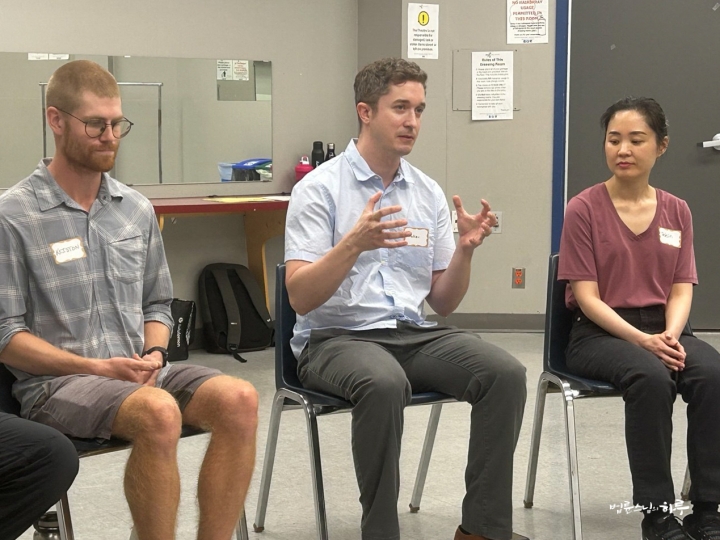
After listening to the participants’ introductions, Sunim explained in an easy-to-understand way the difference between Buddhism’s original teachings and cultural elements. The meeting naturally flowed into questions and answers.
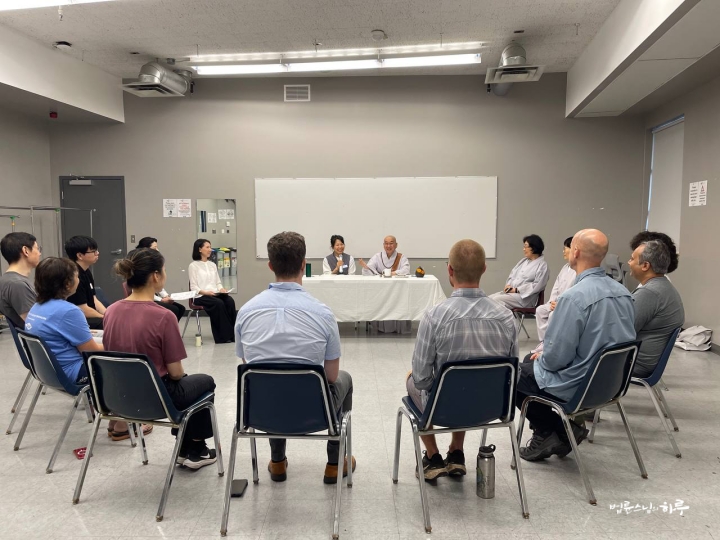
‘Have you recently had any new realizations, Sunim?’
‘I’m currently a university student, and I’m struggling with whether to become a doctor or an engineer.’
‘I’m having conflicts in my marital relationship. How should I resolve them?’
Sunim answered each person’s questions concisely yet profoundly. Sometimes laughter erupted, and sometimes there were solemn moments of nodding in understanding. Although it was a brief meeting of just over an hour, seeds of an English-speaking practice community seemed to sprout as they shared stories and empathized with each other.
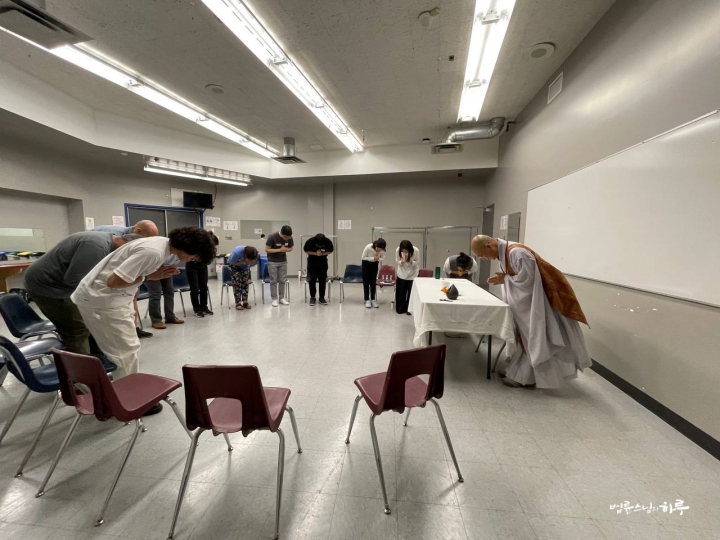
As the conversation concluded, Sunim presented each participant with a copy of “English Letters of Hope.” Joy was evident on the faces of those holding the books.
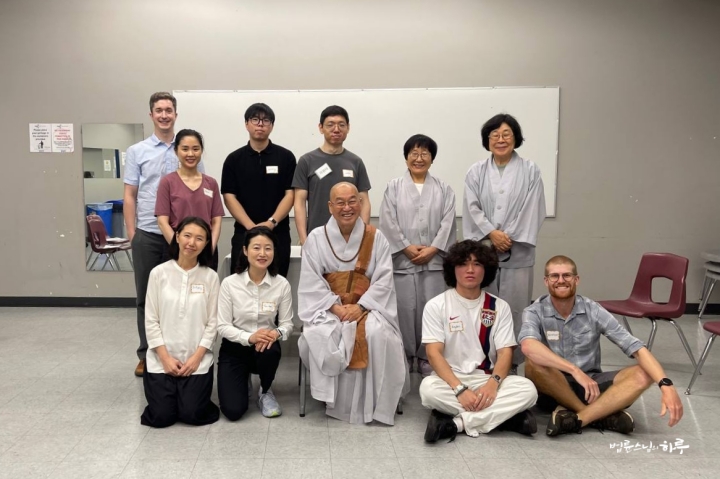
After the meeting, Sunim presented the English edition of “Buddha the Revolutionary” to Han Jung-hee, the North America West Coast Local Group Leader who coordinated the Seattle and Vancouver meetings. He also gave books to Kim Sun-hee and Chatten who managed the Vancouver meeting operations, and Joo Sang-hyu who volunteered as driver, expressing his gratitude and taking commemorative photos together.
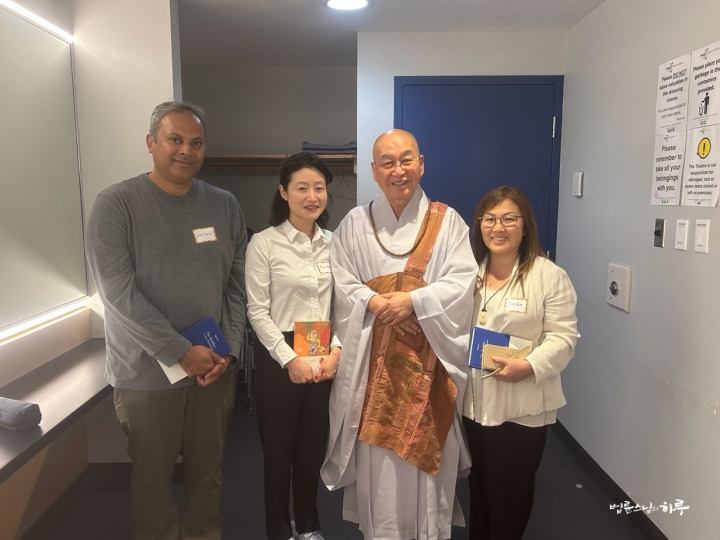
At exactly 4 PM, Sunim came up on stage with 400 seats fully occupied. A big round of applause poured out. Sunim smiled and gave his opening remarks.
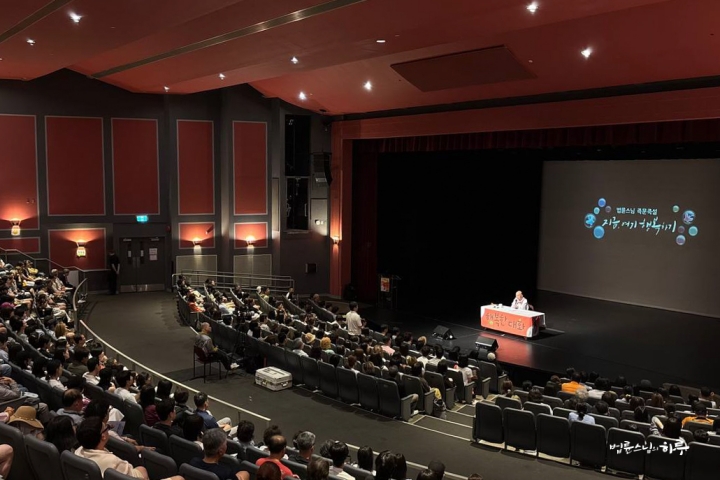
“Was Vancouver hot this summer too?”
“Yes.”
“This place is originally cool, isn’t it? You say it’s hot, but compared to Korea’s heat, it feels like autumn weather. Today is Sunday – did you go to church or temple this morning?”
“Yes.”
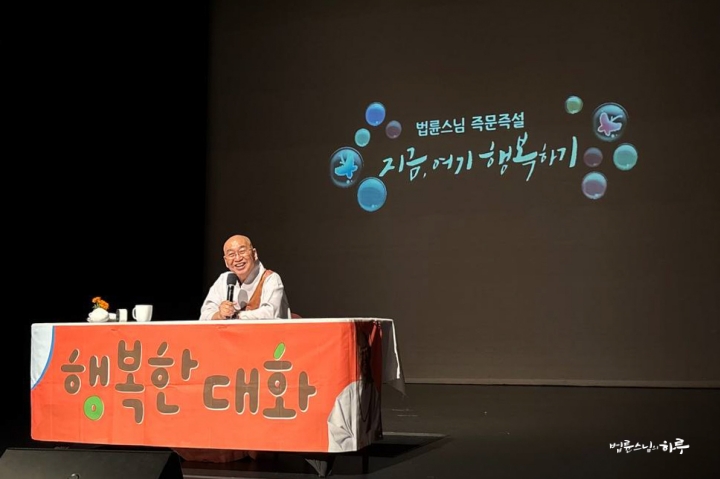
“I scheduled the lecture in the afternoon so you could go to church or temple. When I held morning lectures before, I received complaints from temples. They said people come to temple just once a week for services and to make offerings, but when Venerable Pomnyun scheduled morning lectures, everyone went there instead. They complained that no one came to the temple and they couldn’t even pay rent. I hadn’t thought about that. Since then, when holding Dharma Q&A on Sundays, I always schedule it after 3 PM. So I’m glad we could hold today’s lecture at 4 PM.”
Anyone could then raise their hand and ask about their concerns. During the two hours, 13 people were able to have conversations with Sunim. One of them shared their frustration with Sunim, saying they were living an unwanted life in Canada and were suffering because they missed Korea so much.
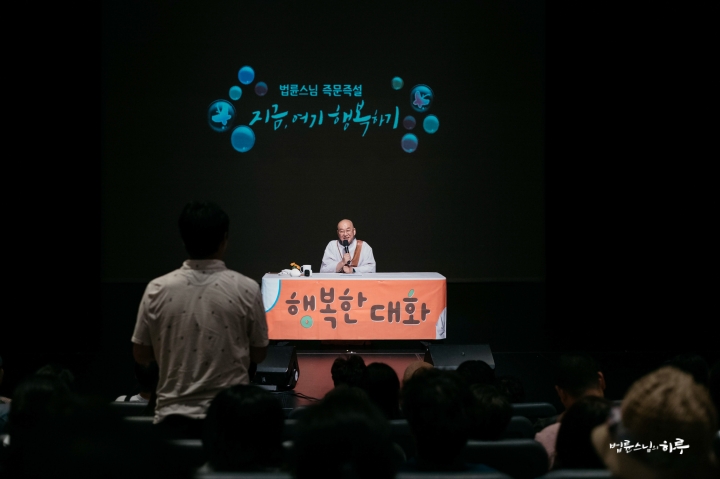
What Should I Do When I Feel Depressed Missing Korea So Much?
“Imagine someone who has been sentenced to 5 years in prison. Being in prison, they would desperately want to get out. They’d want to go out and drink soju, date, and sing. It would be nice if they could leave, but if they can’t, what should they do in prison?”
“I don’t know.”
“Would it be better to keep longing for the outside?”
“I haven’t been to prison yet.”
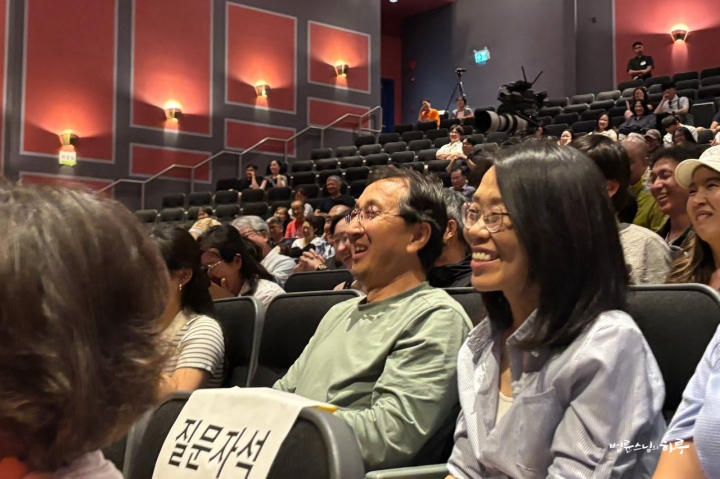
“It seems like you’re imprisoned in a prison called Canada. The most important thing for a person is to do what they can do ‘here and now.’ If you want to go to Korea, just go. But if you can’t go because you’ve been deported or for some other reason, then during the period you have to stay here, it’s best to do your best here. If you’re in prison, you can read a lot of books or exercise a lot. If you’re in the military, you can take advantage of the military and exercise. If they tell you to run one lap around the field, I run two laps. If they tell you to climb the mountain once, I climb it twice. If you accept it actively like this, the time spent there isn’t wasted but becomes an experience. Similarly, if you have no choice but to be here in Vancouver, you could fully learn English during this time.
If you were in Korea, you would have had to live a busy life, but is there really a need to live desperately without weekends even after immigrating all the way to Canada? If you’re going to live like that, why not just stay in Korea? Why come here to live? In Korea, you have to work desperately hard just to make a living, but here you can live while enjoying weekends with your family. When you receive your salary, you pay a lot of taxes, and there’s no need to save money. The government guarantees everything for your old age. So even if you pay taxes now, you can get it all back later. When I meet and talk with elderly people living in Canada, they tell me, “No matter how good a filial child is, there’s no better filial child than the government.” It’s okay to pay $40 in taxes out of a $100 salary. You can think of it as money you’ll use when you’re old.
If you want to live this relaxed and leisurely life, live in Canada. If you want to live a bullet-fast busy life, it’s better to go live in Korea. It’s hard to live busily by yourself when everyone else is living leisurely. Korea has a clique culture where men hang out with men, women with women, children with children, and parents with parents, but Canada is family-centered, right? If you like family-centered culture, live here. If you prefer clique culture, it’s better to move to Korea. Here, you should live by taking advantage of this place’s strengths. Apple farming works well in cold places, so you should go to cold areas. Pear farming works well in warm places, so you should go to warm areas. There’s no need to go to a cold place and build a greenhouse to grow pears, or go to a hot place and turn on air conditioning to grow apples. That’s a wasteful way of using energy. It’s best to observe the characteristics of this society and adapt to it. Even if you came here out of necessity, if you adopt the perspective of fully enjoying the advantages of this society while you’re here, life will become more livable.
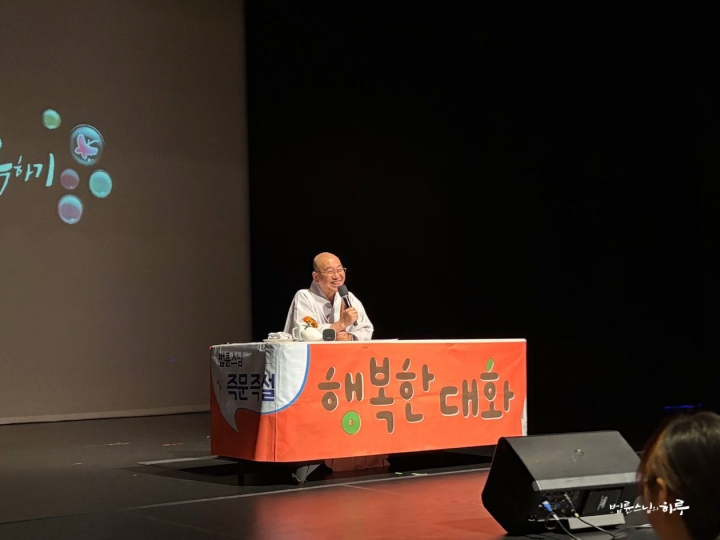
I once went to prison, and while I was there, I met someone who wanted to learn Buddhism. I created a curriculum and was teaching him diligently. I was working hard on what I needed to do, but suddenly they released me. My work wasn’t finished yet. So I asked if I could stay for just one more month, but they said no. When I entered, I didn’t want to go in but was forced to, and when it was time to leave, I didn’t want to go but was forced to leave again – this is how the world works. If you don’t want to leave prison and have work to do there, then it’s not a prison. It’s not the walls that make it a prison – it becomes a prison when you can’t leave when you want to. If you don’t want to leave, it’s not a prison.
I learned a lot while in prison. When they tied my hands and punished me, it was very frustrating at first. But in temples, even though no one confines you in that spacious dharma hall, you stand still when praying. Even without your hands being tied, you don’t move and keep your hands together. You pray like that for one or two hours or more. When my hands and feet were tied and I wasn’t allowed to sit, if I cursed and felt frustrated in that situation, who would be at a loss? The person who tied me up did so to make me suffer. If I suffer, I’m playing into their hands. In such cases, I have no choice but to surrender. But what if I change my mind and decide to pray since I’m already tied up? When your hands are tied and you’re standing, it’s actually good for praying. If they don’t give you food, you can fast. It’s much easier not to eat when there’s no food than to fast when there is food. By changing your thinking like this, you need to find your freedom.
If I find freedom in the given environment, they have no way to torment me. At first, I was in solitary confinement, but because I wouldn’t comply, they threw me into a cell with several other criminals. In a way, it was suffering. But if you go there and befriend those people, the situation changes. Since I’m a monk anyway, I need to spread Buddhism. Rather than being alone, going there and having conversations creates opportunities for dharma propagation. Conversely, if I’m alone, I can meditate. Some people deliberately go into the mountains alone to meditate and live. There’s no need to try to meet people.
My freedom is not something I obtain from others. If I change my thinking in the conditions given to me, I can have freedom anytime. I realized this when I went to prison. I didn’t know it well when I was outside. Therefore, we can live freely anytime, anywhere. I hope you have the perspective to fully enjoy the given present situation. This is called ‘Here, Now, Awake.’ Please repeat after me.”
“Here, Now, Awake. Thank you. This was very helpful.”
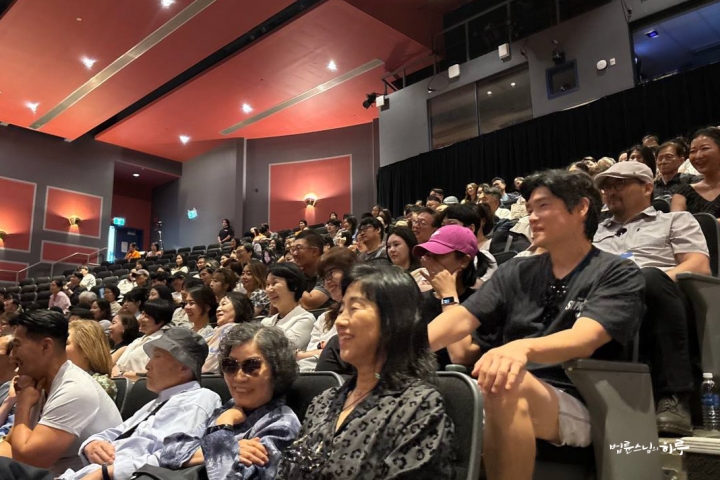
Questions continued to follow.
I don’t know how to educate my children in this rapidly changing world of AI automation.
What should I do about my children who have no interest in Korean culture? I want them to have an identity.
I want to return to Korea to live with my parents, but at the same time, I want to maintain my permanent residency.
I quit my job to find myself and started traveling and YouTube, but my passion and dreams are disappearing, and I’m becoming obsessed with view counts.
I came to Canada with dreams, but I’m becoming increasingly lazy. I need your harsh words, Sunim.
I want to avoid doing things I don’t want to do. What mindset should I have?
It’s hard for me to say no to others. I care too much about others’ opinions and words.
I’m confused about my sexual identity. What is the definition of love?
Will pursuing the joy of achievement interfere with practice?
Too many selves are conflicting, making it hard to define who ‘I’ am.
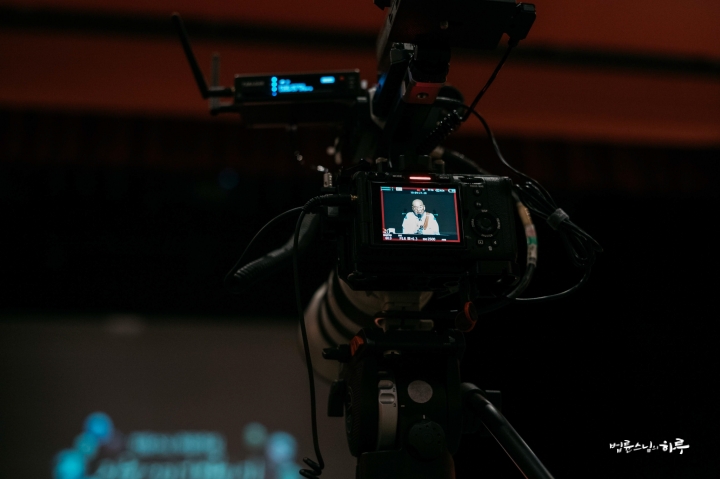
As the conversation deepened, one person asked how to let go of and accept the wounds and anger from interpersonal relationships.
When Wounds from Dating Turn into Hatred, What Should I Do?
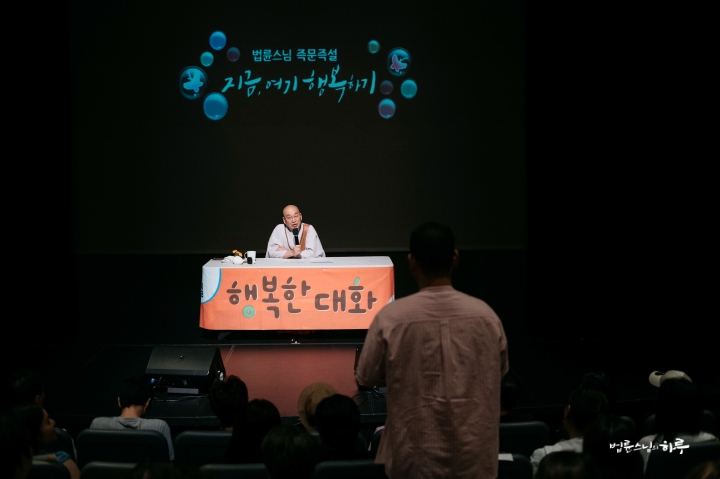
“So you dated a girlfriend and broke up?”
“Yes, that’s right.”
“It was a relationship between adults, right? When adults form relationships, we call it a ‘social contract’ in more sophisticated terms. Can social contracts be terminated or not?”
“They can be terminated.”
“Can you break up after liking each other, or should you not break up if you like each other?”
“You can break up.”
“If I like someone but they don’t like me, should we break up or not?”
“We should break up.”
“That’s right. By that logic, hating someone after breaking up from dating doesn’t make sense. If you hate them because things didn’t go your way, that’s excessively self-centered. If you’re not careful, it could even lead to things like dating violence.”
“I didn’t do that.”

“I’m not saying you did, but there’s that danger. Even if a man and woman are sleeping in the same room, if the other person says no, you should coolly back off at that moment. Relationships are based on mutual affection. If the other person doesn’t want it, no matter how much I like them, we must part. If you don’t even have that basic human respect, it’s not love but desire. If I forcibly embrace someone who doesn’t want it just because I like them, that’s sexual harassment. The act of embracing itself doesn’t become harassment or love. If you embrace someone who doesn’t want it, it’s harassment; if you embrace each other because you both want it, it’s love.
I hope you can be a bit cooler about it. Even if you dated for 10 years, if the other person says they don’t want it, you should immediately say okay. I’m not saying to immediately go ‘you go your way, I’ll go mine,’ but if you love them, wait a little. They’re acting that way because they don’t like it right now, so don’t force it, respect their feelings and wait. But I’m not saying to wait until death.”
“Yes, you’re right.”
“If you think it’s better to wait until death, you can do that too. Young people these days whining about such issues is like being a sticky piece of gum. Drop that mindset completely, and just like washing your hands with soap makes them clean, if the other person says they don’t want it, say ‘Okay!’ and respect their wishes. If you still have lingering feelings, wait a bit and then contact them again asking, ‘I still have feelings for you, is there any chance you might reconsider?’ If they say no, then accept it and move on.”
“I’ll become stronger. Thank you.”
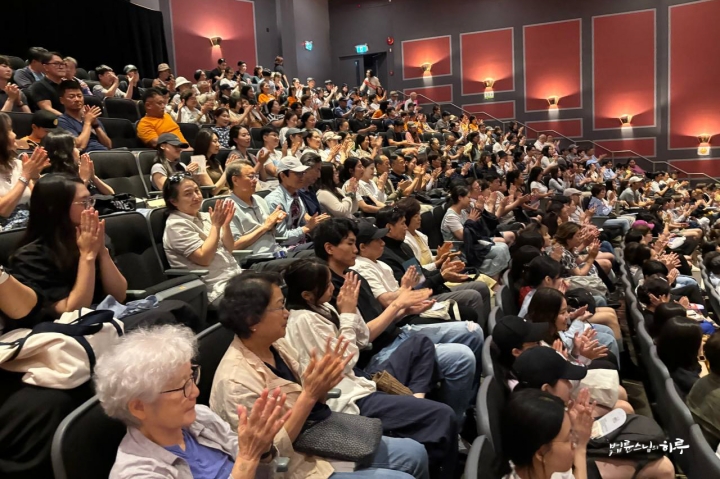
After answering all questions, the lecture ended with loud applause. A book signing session immediately followed on stage. Many people lined up in a long queue.
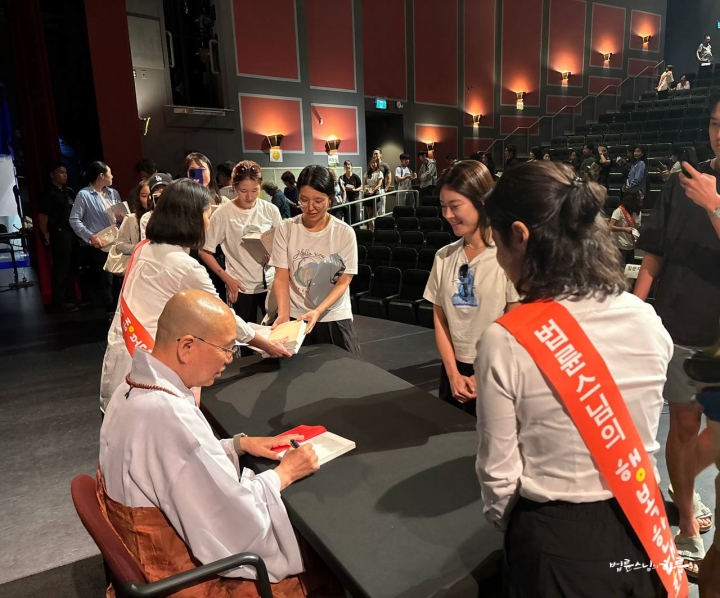
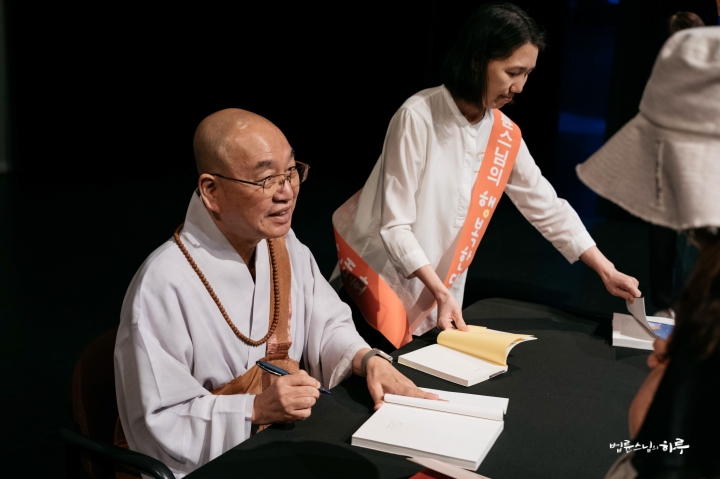
After finishing the signing session, it was 6:30 PM. Sunim took a group photo with the volunteers, shouting “Vancouver!” together.
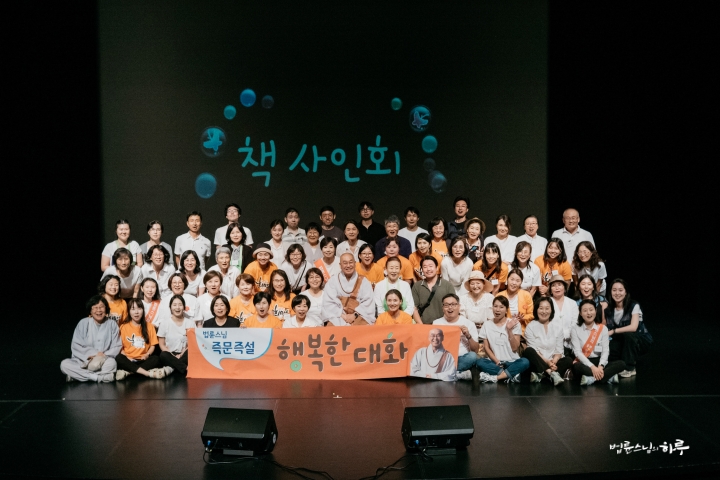
The volunteers then had a mindful sharing session with Dharma Teachers Myodeok and Beophae.
“I’ve lived for over 20 years in a place without a single Korean around. Having this bustling time with so many Koreans through today’s volunteer work was truly enjoyable.”
“I’ve attended Dharma Q&A sessions several times, but this is my first time participating as a volunteer. Above all, the meeting with Sunim and volunteers before the lecture was the best. I was truly happy to see the Sunim I respect up close and have a direct conversation. I want to volunteer again next time.”
The volunteers were diverse – someone who came by boat from Victoria Island, someone who came to volunteer while traveling in Canada from Korea, and someone volunteering for the first time since the Awakening Retreat. Though the volunteers had different backgrounds, they all shared the pride of ‘creating this event together as pieces of a mosaic Buddha.’ Someone participating in volunteer work again after 6 years was surprised, saying ‘Now there are many young volunteers, and the number of Gen MZ participants has noticeably increased.’
While the volunteers continued their sharing, Sunim had a simple dinner with people from Seattle in the waiting room. After finishing the sharing and saying goodbye to the volunteers, they departed for Seattle again at 7:20 PM.
They arrived at the border in 30 minutes, but the line for U.S. immigration was long, and the cars barely moved. Unlike entering Canada in the morning, returning to the U.S. was not easy. After waiting for over an hour, they finally completed immigration. They then drove without stopping and arrived at the Seattle Dharma Center around midnight.
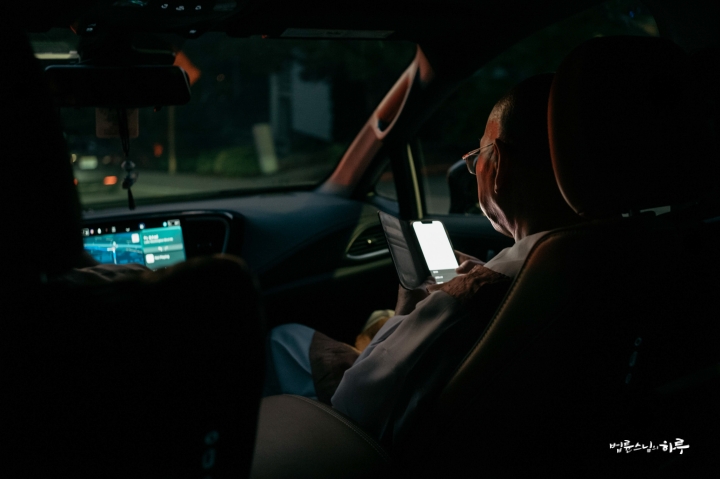
Sunim thanked Kim Hak-ro and Joo Sang-hyu for driving from morning until late at night, and packed for tomorrow’s departure to San Francisco.
Tomorrow, Sunim will leave for Seattle Airport at 6:30 AM, fly to San Francisco Airport, have a meeting with foreign Jungto Society members in the afternoon, and give a Dharma Q&A lecture in San Francisco in the evening.





